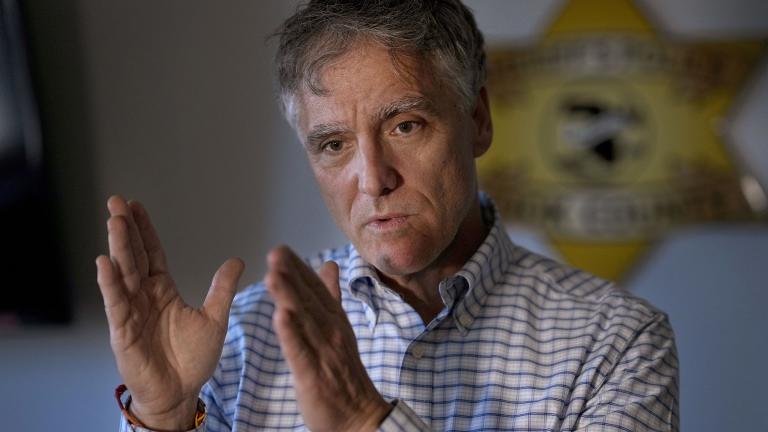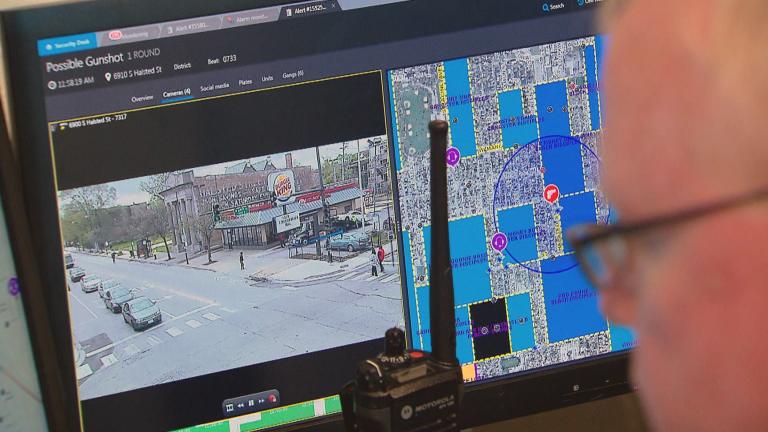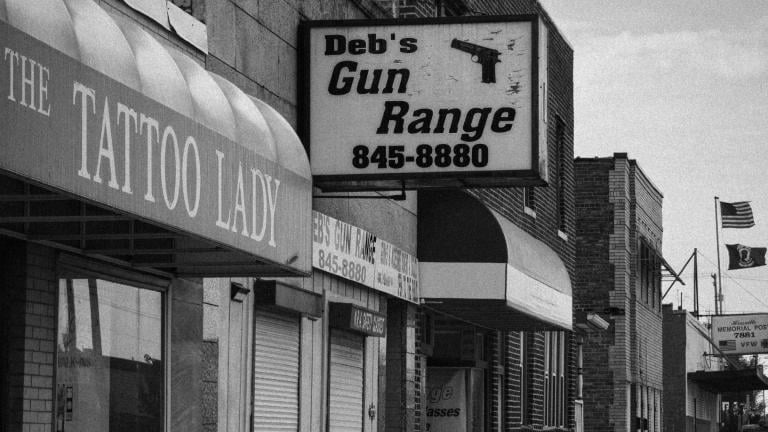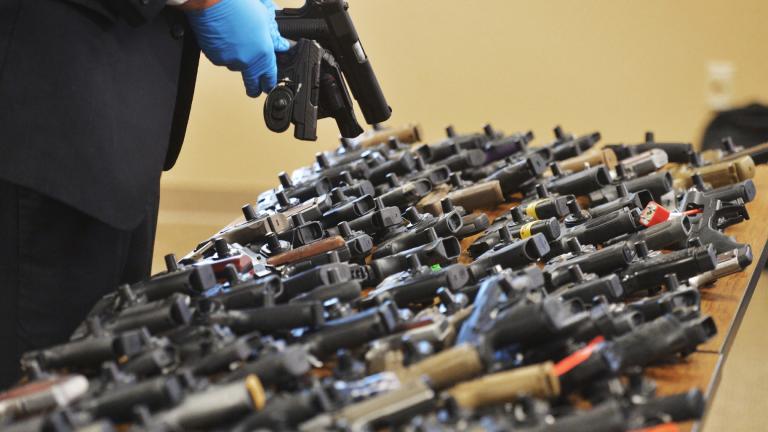Video: The WTTW News Spotlight Politics team discusses Chicago’s overtime bill and other of the day’s top stories. (Produced by Andrea Guthmann)
The city of Chicago spent approximately $524 million on employee overtime in 2023 — 19% more than in 2022, with more than half of the total amount used to compensate Chicago Police Department officers for working extra hours, according to records obtained by WTTW News.
The Chicago Police Department spent $293 million on overtime last year, 40% more than in 2022 and nearly three times the $100 million earmarked for police overtime set by the Chicago City Council as part of the city’s 2023 budget, according to data obtained by WTTW News through a Freedom of Information Act request.
Nearly 350 city employees earned more than $100,000 in overtime alone, on top of their salaries, according to a WTTW News analysis of the data. Of those city workers, 283 belong to the Chicago Police Department.
Between 2019 and 2023, Chicago’s total overtime bill soared 62%, costing Chicago taxpayers an additional $202 million, according to city data. Former Mayor Lori Lightfoot led the city between May 2019 and May 2023, when Johnson took office.
Representatives of Mayor Brandon Johnson declined to answer detailed questions from WTTW News about the city’s 2023 overtime bill.
Several departments spent significantly more on overtime in 2023 than in 2022, with the Chicago Police Department leading the way for the fifth consecutive year, according to a WTTW News analysis of the data.
The Department of Water Management saw its overtime bill soar by $13.7 million in 2023, according to the data. A spokesperson for the water department did not respond to questions about the reason behind the one-year jump of 38% in overtime costs.
In addition, the overtime bill for the Chicago City Clerk’s office nearly doubled to $105,485 amid several unscheduled special City Council meetings and a new union contract that requires employees be compensated directly for working additional hours rather than allowed to take time off, according to Diana Martinez, a spokesperson for City Clerk Anna Valencia.
Just two city departments spent less on overtime in 2023 than in 2022, including the Chicago Fire Department, which saw overtime bill drop by $24.7 million. A fire department spokesperson did not respond to questions about the reason behind the decline, which amounted to a decline of more than 22%, according to the data.
The only other department to spend less on overtime was the Chicago Department of Public Health, which scaled back operations after federal officials declared in May 2023 that COVID-19 no longer represented a public health emergency. Overall, CDPH employees earned approximately 13% less overtime in 2023 than in 2022.
Watchdog: Officials Must ‘Reimagine’ Function of Police Department
Even though the Police Department has exceeded its budget every year since 2019, the City Council once again set aside just $100 million to cover the department’s overtime bill in the 2024 budget.
City leaders should be more transparent about what police overtime will cost taxpayers during the annual budget process, Inspector General Deborah Witzburg told WTTW News.
“We know that it is going to cost more than what has been budgeted,” Witzburg said. “We need to grapple with the reality that those dollars are coming from somewhere.”
The data obtained by WTTW News shows no evidence that Chicago Police Supt. Larry Snelling has made good on promises he made in October to members of the Chicago City Council that he would get a handle on employee overtime.
Chicago taxpayers spent $167.5 million on overtime for police officers between July and January, under Snelling’s leadership, as compared with $126.5 million during the first six months of the year, according to city records.
Chicago taxpayers spent significantly more on overtime for officers even though Snelling ended the practice of routinely canceling officers’ regular days off instituted by former Supt. David Brown.
“The Chicago Police Department takes its fiscal responsibility seriously and regularly reviews internal operations to ensure the overtime budget is used efficiently and effectively,” according to a statement from a CPD spokesperson.
After Snelling took over the department, he made CPD’s 22 district commanders "directly responsible for reviewing and approving the use of overtime under their supervision so that it is used appropriately and judiciously. This allows for strengthened accountability both fiscally and operationally,” according to the statement from CPD.
CPD officials said their operations have not only been strained by a nationwide staffing crunch that has hit law enforcement agencies but also by the need to police major events and large gatherings throughout Chicago, including the NASCAR Chicago Street Race and the Air and Water Show.
Witzburg said the city’s massive police overtime bill during the first six months of 2023 coupled with several years of double-digit increases in overtime spending indicates a “deep problem” with how CPD is managed and how the city’s public safety resources are allocated.
Chicago’s watchdog has been warning for more than six years that the money spent to pay officers overtime was “wasted” and fueled burnout, making misconduct and abuse more likely, first in an audit released in 2017 and then in a follow-up audit released in February 2020.
Johnson has vowed to transform the Chicago Police Department into an agency prepared to implement a “holistic” approach to public safety that focuses on the “root causes” of crime, and began that effort by making 398 of the department’s more than 11,700 sworn positions into jobs open to civilians, who would not have law enforcement powers as part of the city’s 2024 budget.
A spokesperson for the Office of Management and Budget said Johnson's plan to add civilian positions to the department and return hundreds of officers to law enforcement tasks, including patrol, will reduce overtime costs.
"Through regular and ongoing meetings, we have not only monitored expenditures, but have also been a strategic partner towards minimizing the reliance on overtime in 2024 and beyond," according to a statement sent to WTTW News.
CPD members who do not have police powers earn significantly less, which could help reduce the city’s overall overtime police budget, Witzburg said.
But it won’t be possible for police brass to hire enough new officers to make a noticeable dent in the police overtime bill, which is a sign of deep mismanagement, Witzburg said.
“We are overdue, at a very high cost, to reimagine the function of the police department,” Witzburg said. “We can’t hire our way out of this. It is not practical.”
CPD leaders have until May 1 to hire an organization to conduct a study of whether officers are efficiently and effectively deployed across the city to stop crime and respond to calls for help, as required by the federal court order requiring the police department to change the way it operates.
Witzburg said she is hopeful that study could spur much needed changes, but noted that the 5-year-old consent decree has long required that study.
There is no evidence the city’s police overtime bill will be significantly less this year, especially with the Democratic National Convention coming to town in August. While a $75 million federal grant offset the cost of security for the event expected to formally make President Joe Biden and Vice President Kamala Harris their party’s nominees in the 2024 presidential election, officers are likely to have to work overtime to ensure adequate patrols citywide.
A Safer City is supported, in part, by the Sue Ling Gin Foundation Initiative for Reducing Violence in Chicago.
Contact Heather Cherone: @HeatherCherone | (773) 569-1863 | [email protected]
Contact Jared Rutecki: @JaredRutecki | [email protected]







